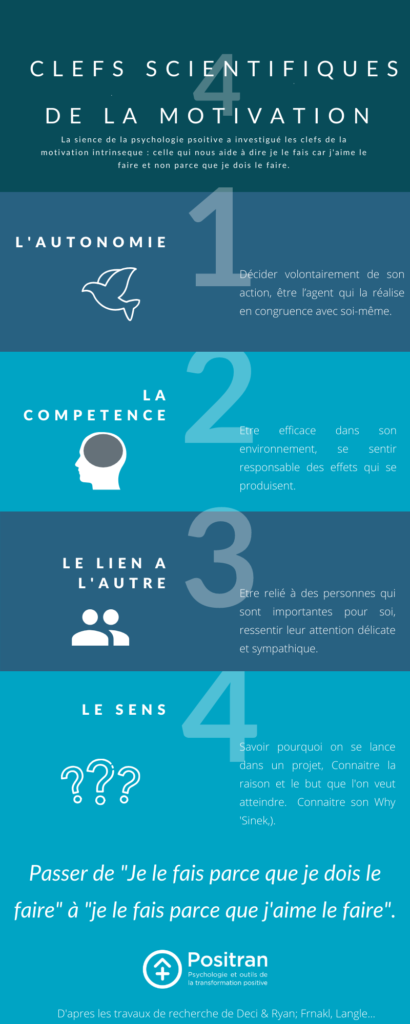Positive psychology, or the science of happiness, investigates the optimal functioning of individuals, groups, and institutions. It has therefore been evident that research has focused on human motivation.
What helps me get started when I feel stuck? How do I stop procrastinating? How do I not give up? How do I get started when I'm afraid I won't succeed or when I'm bored? Where do I start? What factors need to be in place for me to want to get started? How do I mobilize them to be absorbed in what I'm doing?
Here are some keys to motivate you!
Theory of Reference: Self-Determination
Among all the existing theories, it is that of Deci & Ryan that has marked the whole current of positive psychology. Indeed, these two researchers have demonstrated that we oscillate between different types of motivation oscillating from extrinsic motivation to oneself to intrinsic motivation to oneself. In other words, either we motivate ourselves to have something from the situation like a salary or benefits or we motivate ourselves for something inside us. It is this motivation which is called intrinsic and which is the one that we must seek to achieve to be truly motivated .
But how do we go about it? Phew, Deci & Ryan have given us some ideas here again, which we're sharing with you. We all have three basic needs: autonomy, competence, and connection to others. To which we can add the need for meaning.
But how do we go about it? Phew, Deci & Ryan have some more ideas for you to share with us. We all have three basic needs . These are the ones we need to try to satisfy to truly motivate ourselves.
To voluntarily decide on one's action, to be the agent who carries it out in congruence with oneself.
How to satisfy your need for autonomy?
- Ask yourself how do I move from I do it because I have to do it to I do it because I love doing it?
- Aren't there things you can do in this project to feel more autonomous: choosing the timing, the way of doing things, the work team, the work location?
- Have you identified the project's milestones and key deadlines? Having a clear vision of the project helps you get started.
- 2 short-term motivation techniques:
1- “Eat the frog first”: start with the most difficult part of the project (example: writing the complicated email or investigating the complex administrative file): once done, the rest will seem easy!
2- Set yourself very tight deadlines to give yourself a boost (example: “I have two hours to send this document)”.
FACTOR 2: Competence
Being effective in one's environment, feeling responsible for the effects that occur.
How to satisfy this need?
- Nothing saps motivation more than a lack of self-confidence. Make a list of your past successes, ask yourself what you've achieved and what skills you've used. Examine these successes in detail to find your keys to success.
- Do you know your strengths? Then rethink your different tasks to match them with your strengths: you will feel authentic, efficient, and energized. To pass the test, Click here . To play with your loved ones, Discover our force maps.
- Have fun! If you laugh, share, and have fun, you will develop your positive emotions and creativity. These resources will help you motivate yourself and, best of all, motivate others because “positivity” is contagious. Read researcher Barbara Fredrickson on the topic.
- Is your task challenging enough? Is it unattainable? Make sure you challenge yourself without being afraid. Find the right mix to get into flow (or optimal motivation): a video to help you.
- Look at and celebrate your successes. Your failures become keys to learning, your successes keys to joy and perseverance.
FACTOR 3: The link to the other
Being connected to people who are important to you, feeling their delicate and sympathetic attention.
How to satisfy this need?
Do you have a shared vision for the project? Make sure everyone understands the purpose of the project so that they can be a driving force, committed, and loyal part of the project.
Look at how your role models succeed? What do they do? How do they actually go about it? What are their tips and advice? What do you appreciate about their work? Their attitude? These people who inspire you are sources of motivation.
Do you have people who can make you think differently? Make sure you confront your ideas and ways of doing things with other people: they can help you see things from a different perspective, change your strategy, or even see new, more positive ways of moving forward.
Do you have support around you? Identify people who can help you with technical issues? Financial issues? Who can listen to you? Love you? Motivate you? These strong relationships will help you get started, stay on course in the storm, and open the champagne once you've reached your goal. (Discover the keys to strengthening your positive relationships at work.)
The 4 keys to motivation in positive psychology --> Autonomy, Competence, Connection to others and Meaning
When faced with any situation where you feel stuck, struggling, or procrastinating, take the time to ask yourself these questions about your four fundamental needs. The keys to getting started are bound to be found in one or more of these factors. Good luck!
Download the infographic below for free (right click then save the image) 👇🏼 The 4 keys to motivation in Positive Psychology 👇🏼

Go further with the 4 keys to motivation in positive psychology
At work:
- Master the scientific knowledge and practices surrounding motivation at work in our training module: All the pieces of the human motivation puzzle.
- Suggest a conference on optimal motivation
- Listen to Dan Pink on intrinsic motivation in this TEDx video
In positive education:
- Work on motivating children with our training module: Motivation and Learning
- Discover our book: For motivated teens




Leave a comment
All comments are moderated before being published.
This site is protected by hCaptcha and the hCaptcha Privacy Policy and Terms of Service apply.